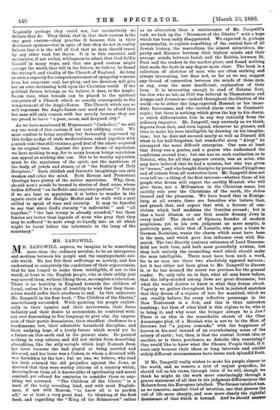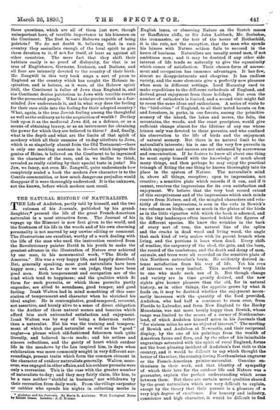MR. ZANGWILL.
MR. ZINGWILL aspires, we imagine, to be something more than the ordinary novelist, to be an interpreter and medium between his people and the unsympathetic out- side world. He has felt their sufferings so acutely, and has understood so completely the conditions of their separateness, that he has longed to make them intelligible, if not to the world, at least to the English people, who in their coldly just way accord them, without liking them, so complete a toleration. There is no hostility in England towards the children of Israel, unless it be a sign of hostility to wish that they them- selves would suffer their aloofness to end. In this endeavour Mr. Zangwill in his first book, "The Children of the Ghetto," marvellously succeeded. While painting his people realisti- cally in their squalor and their narrowness, their fierce industry and their desire to accumulate, he contrived with- out ever descending to fine language to give also the impres- sion of their poetic dreaminess, their steadfast obedience to a burdensome law, their •admirable household discipline, and their undying hope of a lovely future which would yet be a future on this earth and in the present state. He painted nothing in rosy colours, and did not shrink from describing absurdities, like the silly scruple which kept Hannah from her lover because she had played at being married and divorced, and her lover was a Cohen, to whom a divorced wife was forbidden by the law ; but no one, we believe, who read his book retained the old prejudice against the Jews, or doubted that they were worthy citizens of a country which, deriving from them all it knows alike of spirituality and moral conduct, yet refused for centuries to consider them as any- thing but accursed. "The Children of the Ghetto" is a book of the truly revealing kind, and with most English- men, if not with Heaven, "to know all is to pardon all," or at least a very great deal. So thinking of the first book, and regarding the "King of the Schnorrers" rather as an aberration than a continuance of Mr. Zangwill's task, we took up the "Dreamers of the Ghetto" with a hope which has been sadly disappointed. We expected it, perhaps unreasonably, to explain something of the central fact of all Jewish history, the marvellous, the almost miraculous, dis- parity and distance between their highest minds and their average minds, between Isaiah and the Rabbis, between St. Paul and the traders in the market-place, and found nothing that made the facts in any degree more clear. The book is a collection of sketches of men who are often striking and always interesting, but does not, so far as we see, suggest any thread of connection between the minds of those men, or any, even the most insufficient, explanation of their lives. It is interesting enough to read of Zabatai Zevi, the Jew who so late as 1648 was believed in Thessalonica and Aleppo and Jerusalem—indeed throughout the Ghettos of the world—to be either the long-expected Messiah or his imme- diate forerunner, and who excited alarm even in Constanti- nople ; but there is nothing which gives the key to his charm, or which differentiates him in any way radically from the ordinary impostor. Mr. Zangwill, very unwisely as we think, departs from fact, and even legend, whenever he pleases, and tries to make his hero intelligible by drawing on his imagina- tion; but he does not succeed nearly so well as Disraeli did when in his half-forgotten but wonderful story " Alroy" he attempted the same difficult enterprise. One sees at least that Alroy was a genius, and a genius who understood the conditions around him; but one has no such realisation as to Zabatai, who, for all that appears certain, was an actor, who may have believed that he had a mission, but who was given to" scenes," and who bought disciples by promises of kingdoms and of release from all restrictive laws. Mr. Zangwill does not even tell us—a thing of the first interest—whether those of his people who dream still expect the earthly Messiah who will give them, not a Millennium in the Christian sense, but earthly rule over the Christians of the earth, the riches thereof and the pleasures. We have heard that in Konigs- berg, at all events, there are Israelites who believe that, and preach that, and expect that with a fervour of con- viction which half maddens the Gentiles around ; but is that a local illusion or one that assails dreamy Jews in every land? The sketch of Spinoza, founder of modern scepticism, yet in his own judgment no mere sceptic, is positively poor, while that of Lassalle, who gave a brain to German Socialism, wants the charm which must have been in the man, and which gave him influence even with Bis- marck. The two directly contrary estimates of Lord Beacons- field are both true, and both most powerfully written, but they lack entirely the reconciling word which should make the man intelligible. There must have been such a word, for in no man are there two absolutely opposed natures ; but it has either not been given to Mr. Zangwill to discern it, or he has deemed the secret too precious for the general reader. He only tells us, in fact, what all men knew before, that the lofty-minded among Jews are great dreamers ; but what the world desires to know is what they dream about. Vaguely we gather throughout his book in isolated snatches that they dream of a regime of love for mankind, which we can readily believe, for every reflective personage in the New Testament is a Jew, and this is their unbroken teaching; but then of what kind is this regime to be, who is to bring it, and why must the bringer always be a Jew P There is an idea in the remarkable sketch of the Ober Ammergau play, of a Messiah who is not to be the Man of Sorrows but "a joyous comrade," with the happiness of heaven in his soul instead of an overwhelming sense of the misery of earth ; but, then, is that the central Jewish idea or another, or is there, perchance, no definite idea remaining ? One would like to know what the Chosen People think, if it were only because their ideas at long intervals and amidst widely different circumstances have borne such splendid fruit.
If Mr. Zangwill really wishes to make his people clearer to the world, and so remove a mist of unjust prejudice, he should tell us his views, through tales if he will, though we think he might do the work more convincingly through a graver statement of all that in his judgment differentiates the Hebrew from the European intellect. The former intellect has, as we conceive, another kind of intuition, one that pierces the veil of life more sharply, and sees more clearly the rightful dominvnee of that which is beyond. And he should answer three questions, which are all of them just now, though unimportant here, of terrible importance to his kinsmen on the Continent. The first is,—are Hebrews capable of being patriots ? We do not doubt it, believing that in each country they assimilate enough of the local spirit to give them devotion to it, if not for itself, at least as against all other countries. The mere fact that they shift their habitats easily is no proof of disloyalty, for that is as true of Englishmen, Germans, Irishmen, and Italians, and all four are intensely devoted to the country of their birth. Mr. Zangwill in this very book sings a sort of pman to England as the country which has caught the Hebraic in- spiration, and is heiress, as it were, of the Hebrew spirit Still, the Continent is fuller of Jews than England is, and the Continent denies patriotism to Jews with terrible results for the persecuted people. What is the precise truth as a f air- minded Jew understands it, and in what way does the feeling for their race slide into the feeling for their adopted country ? What, again, is the true Jewish feeling among the thoughtful as well as the ordinary as to the acquisition of wealth ? Do they look upon it as the medimval Jews did, as a defence, or as a means of obtaining luxury, or as an instrument for obtaining the power for which they are believed to thirst ? And, finally, what is the depth and what are the limits of that spirit of mockery which all their enemies of to-day attribute to Jews, which is BO singularly absent fam the Old Testament—there is only one mocking sentence in it—but which inspires the genius of Heine, is believed on the Continent to be ingrained in the character of the race, and is, we incline to think, revealed as really existing by their special taste in jests P No sew, we fancy, not even Mr. Zangwill, quite understands how completely sealed a book the modern Jew character is to the Gentile communities, or how much dangerous prejudice would disappear if it were thoroughly understood. It is the unknown, mot the known, before which modern men recoil.







































 Previous page
Previous page